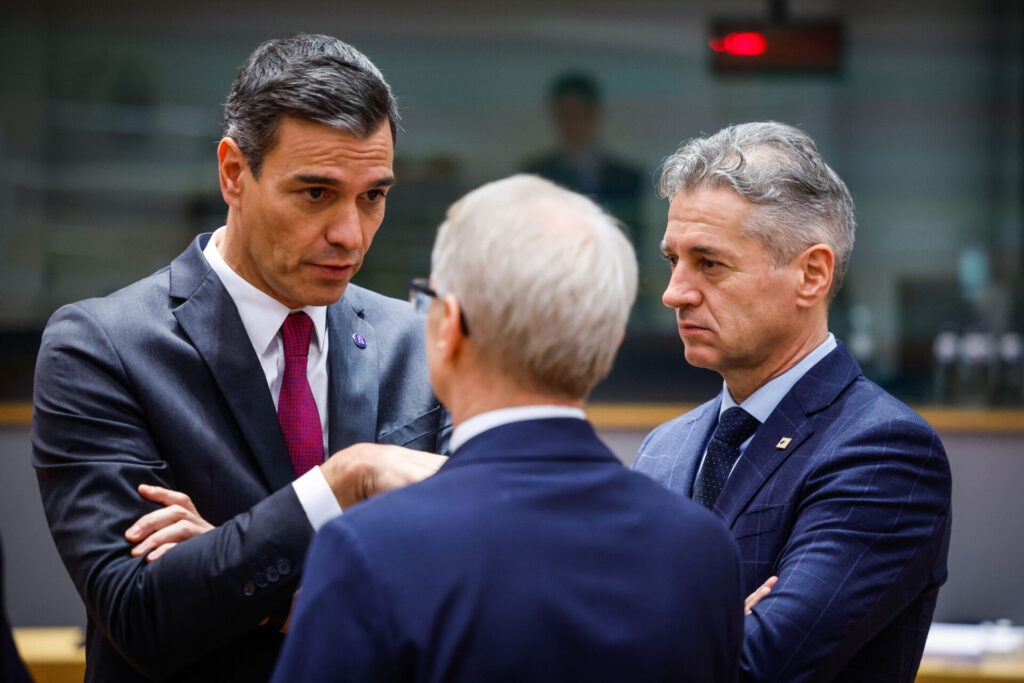 Have the article read by OpenAI (Beta). Please note that AI translations may take some time to process.
Have the article read by OpenAI (Beta). Please note that AI translations may take some time to process.European leaders will meet in Brussels on December 14 and 15 for the last European Council summit of the year. Among other things, financial aid for Ukraine will be discussed at the summit as part of the negotiations on the long-term EU budget for the period 2021 to 2027 – a budget that comprises around 1.1 trillion Euro.
In June, the European Commission requested a 66 billion Euro top-up of that budget.
Several countries, including Germany, had strongly criticised the request for more money. There is only broad agreement on further payments for Ukraine, although Hungarian Prime Minister Viktor Orbán is threatening to veto this.
Hungary opposes increase in aid
Orbán has reiterated Budapest’s opposition to the Commission’s proposed budget review, which includes, among other things, 50 billion Euro earmarked for Kyiv, suggesting the creation of “a separate financial fund, outside the EU budget, based on an intergovernmental agreement” with contributions from member states on a voluntary basis. “Everyone,” he explained, “should put the money they want for Ukraine” into this ad hoc fund.
Orbán opposes any increase in aid to Ukraine, which is part of the proposal on the table and requires unanimous agreement. However, it is not the only difficulty, as the rest of the countries also have divergences regarding migration management and how to obtain the funds to raise the support items for Kyiv.

At the same time, Budapest is waiting on the European Commission to take a decision on the release of part of the European funds, up to ten billion Euro, intended for Hungary. The tug-of-war between Brussels and Budapest over the release of funds is intertwined with two of the main issues on the table at this week’s summit: the green light for Ukraine to begin EU accession negotiations and the Commission’s proposed budget review.
Overall, the EU has ordered the freezing of some 22 billion Euro in cohesion funds for the 2021 to 2027 programming period and 5.8 billion Euro in recovery funds in response to violations of the rule of law alleged against Viktor Orbán’s government. In December, EU finance ministers approved the payment of 920 million Euro to Hungary as part of a review of its recovery plan. This decision, announced by the Council of the European Union, comes just a few days before the Commission is due to release nearly ten billion Euro in cohesion funds intended for Hungary. These payments have been suspended under the horizontal enabling conditions pending an improvement in the independence of the judicial system through a number of reforms.

Spain seeks compromises to unblock budget amid Hungary’s aid refusal
Spain, which currently holds the rotating EU presidency, has proposed to reduce the requested amount by the European Commission to the Member States for the EU budget for the next four years roughly by half, from 66 billion to 36 billion Euro. The fund of 50 billion Euro for Ukraine would remain intact.
The Spanish proposal means reducing the Multiannual Financial Framework for the period 2024 to 2027 from the 99 billion Euro proposed by the European Commission to 84 billion, while the ‘fresh’ money would be cut from 65.8 billion to 51 billion, to which another 33 billion would be added in the form of loans to Ukraine.
With this proposal, Spain is seeking to make concessions to those countries most reluctant to make extraordinary disbursements for the budget and to respond to Hungary’s refusal to allocate funds to Ukraine, in an attempt to unblock the debate ahead of the next leaders’ meeting.
To fill the gap in the budget, it proposes to redirect 15 billion Euro from existing plans and to count on another extra 15 to 17 billion Euro that it hopes to obtain from revenues from frozen Russian assets.
Slovenia’s Prime Minister on the budget review: balance is needed
Slovenian Prime Minister Robert Golob believes that the revision of the EU’s Multiannual Financial Framework (MFF) must be balanced. While Slovenia supports additional funding for Ukraine, the government thinks this is not the only additional spending that should be accounted for. It wants the inclusion of other priorities such as migration, the Solidarity Fund and the Western Balkans, Golob said on the sidelines of the EU leaders’ summit in October.
“We want the package to be balanced and we will defend this position,” Golob said. Furthermore, Slovenia is hoping to benefit most from the increase in the Solidarity Fund, as it was hit by severe floods in August.
“We want the package to be balanced and we will defend this position.”
Robert Golob, Prime Minister of Slovenia
European leaders are set to decide on the EU budget on Thursday and Friday during their last gathering of the year. The outcome is uncertain, because all these issues require unanimity – and Orbán’s threat to veto the plans will prove to be a major stumbling block in the negotiations.
This article is published weekly. The content is based on news by agencies participating in the enr.
